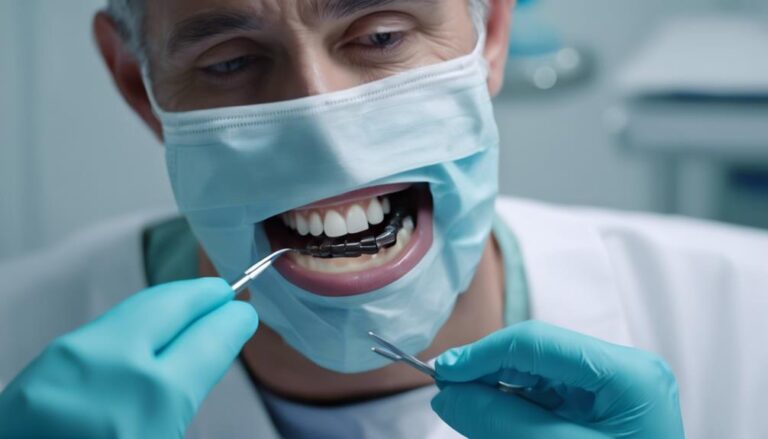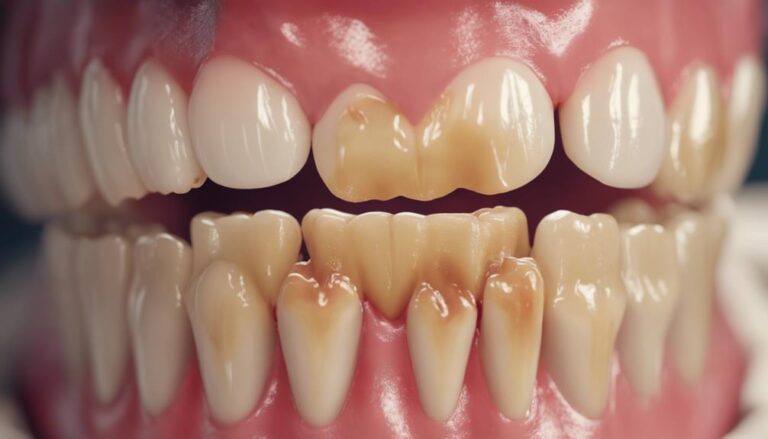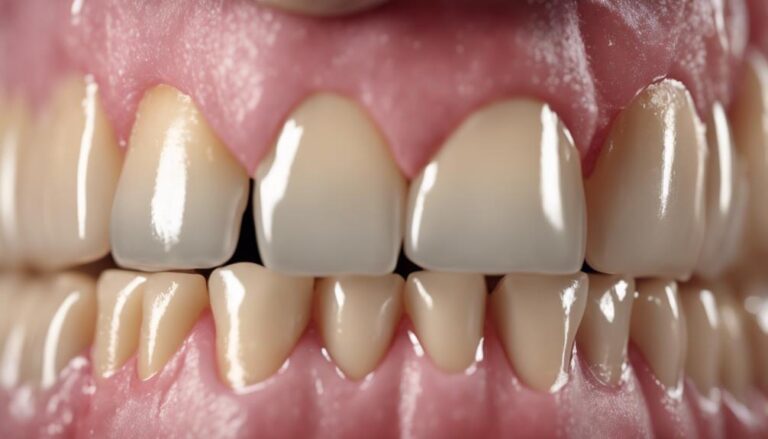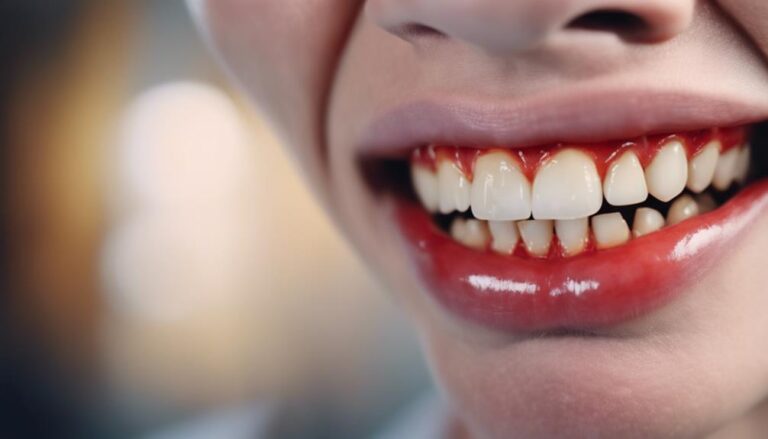Gum disease causes bad breath because bacteria thrive in plaque due to poor oral hygiene, resulting in a foul odor. Neglecting oral care allows bacteria to multiply rapidly, leading to persistent bad breath. Addressing this promptly is essential for fresh breath. Additionally, inflammation of gums and periodontal pockets can exacerbate the situation, causing further bacterial growth. Maintaining good oral hygiene practices and seeking professional dental cleanings are essential steps to combat bad breath caused by gum disease. Understanding the link between gum health and breath odor is important for overall oral health. Further insights into this connection can reveal more about its impact.
Key Takeaways
- Gum disease causes bad breath due to bacteria buildup.
- Plaque and bacteria in the mouth lead to halitosis.
- Infections in periodontal pockets contribute to foul odor.
- Dry mouth from gum disease can worsen bad breath.
- Poor oral hygiene allows bacteria to thrive, causing bad breath.
Gum Disease Overview
Gum disease commonly affects millions of people worldwide, causing inflammation and damage to the gums. Understanding gum disease is vital for effective treatment. In its early stages, known as gingivitis, gums become red, swollen, and bleed easily. If left untreated, gingivitis can progress to periodontitis, where the gums pull away from the teeth, forming pockets that become infected. Treatment options for gum disease vary depending on the severity. In mild cases, professional cleaning and improved oral hygiene practices may be sufficient. However, advanced periodontitis may require scaling and root planing, antibiotics, or even surgery to restore gum health.
Prevention is key in combating gum disease. Consistent oral hygiene practices such as brushing twice a day, flossing daily, and regular dental check-ups can help prevent gum disease from developing or progressing. Understanding the importance of good oral hygiene and seeking prompt treatment for any signs of gum disease are essential for maintaining healthy gums and overall oral health.
Plaque Build-Up
Plaque build-up on teeth is a common precursor to gum disease, characterized by the accumulation of bacteria-laden sticky film on tooth surfaces. Proper oral hygiene practices are vital in preventing plaque build-up and subsequent gum issues. Regular brushing, flossing, and dental check-ups are essential to maintain oral health. Additionally, professional cleanings help remove plaque and tartar that regular brushing may miss.
| Plaque Removal Methods | Effectiveness |
|---|---|
| Brushing Twice a Day | High |
| Flossing Daily | High |
| Mouthwash Use | Moderate |
| Professional Cleaning | High |
Effective plaque removal techniques are key to preventing gum disease. Brushing at least twice a day with fluoride toothpaste, flossing daily to clean between teeth, and using mouthwash can greatly reduce plaque. However, even with these practices, plaque can harden into tartar, requiring professional cleaning by a dentist or dental hygienist. Maintaining good oral hygiene habits is the cornerstone of preventing plaque build-up and the associated risks of gum disease and bad breath.
Bacteria Growth
Bacteria thrive in the warm, moist environment of the mouth, contributing to various oral health issues if not properly managed. Oral hygiene plays an important role in controlling bacteria growth in the mouth. When oral hygiene practices like brushing and flossing are neglected, bacteria can multiply rapidly, forming a biofilm known as plaque on the teeth. This plaque provides a conducive environment for bacteria to thrive and multiply, leading to an increased risk of gum disease.
Poor oral hygiene allows bacteria to accumulate on the teeth and gums, leading to inflammation and infection. These bacteria release toxins and volatile sulfur compounds, which are responsible for the unpleasant odor associated with bad breath. Regular brushing, flossing, and professional dental cleanings are essential to remove plaque and prevent excessive bacteria growth in the mouth.
Maintaining good oral hygiene practices is important in controlling bacteria growth, reducing the risk of gum disease, and combating bad breath. By keeping the mouth clean and free of bacteria, individuals can promote overall oral health and prevent the negative consequences associated with bacterial overgrowth.
Inflammation of Gums
The swelling and redness of the gum tissue, often accompanied by tenderness, can indicate the presence of inflammation in the oral cavity. Gum inflammation, also known as gingivitis, is a common condition caused by the buildup of bacteria along the gumline. Prevention is key in managing gum inflammation. Maintaining good oral hygiene practices such as regular brushing, flossing, and dental check-ups can help prevent the onset of gum inflammation.
When gum inflammation occurs, there are various treatment options available to provide relief. Professional dental cleanings can help remove plaque and tartar that contribute to gum inflammation. In some cases, dentists may recommend antimicrobial mouthwashes or prescribed antibiotics to combat the infection. Additionally, lifestyle changes like quitting smoking and improving diet can aid in reducing gum inflammation.
It is essential to address gum inflammation promptly to prevent it from progressing into more severe forms of gum disease. By taking proactive steps to prevent and treat gum inflammation, individuals can maintain excellent oral health and avoid the associated bad breath.
Periodontal Pockets
Periodontal pockets are deep spaces that form between the gums and teeth, often indicating advanced stages of gum disease. These pockets can vary in depth, with measurements taken by a dentist to determine the severity of the condition. Monitoring pocket depth is vital in evaluating the progression of gum disease and planning appropriate treatment strategies.
| Pocket Depth | Treatment Options |
|---|---|
| Shallow (1-3mm) | Professional cleaning, improved oral hygiene practices |
| Moderate (4-6mm) | Scaling and root planing, antibiotic therapy |
| Deep (>6mm) | Gum surgery, tissue regeneration procedures |
Gum recession, a common consequence of periodontal pockets, can lead to increased pocket depth and further complications. To prevent gum recession and the formation of deeper pockets, maintaining good oral hygiene is essential. Regular brushing, flossing, and routine dental check-ups can help prevent the progression of gum disease. Seeking early intervention from a dental professional is key to managing periodontal pockets effectively and preserving oral health.
Pus Formation
Formation of pus, a thick fluid containing white blood cells, dead tissue, and bacteria, is a common indicator of infection in periodontal pockets. When bacterial infection sets in, the body’s immune response triggers the formation of pus as it attempts to fight off the harmful bacteria. Pus is fundamentally a collection of immune cells, bacteria, and tissue debris that have accumulated in response to the infection.
In the context of gum disease, pus formation occurs within the periodontal pockets that develop between the gums and teeth. These pockets provide an ideal environment for bacteria to thrive and cause infection. As the infection progresses, the body sends white blood cells to the site to combat the bacteria, leading to the accumulation of pus.
The presence of pus in the gums is a clear sign of an active bacterial infection that requires prompt attention. If left untreated, the infection can spread, causing further damage to the gums and potentially leading to more severe complications. Regular dental check-ups and proper oral hygiene are essential in preventing pus formation and addressing bacterial infections effectively.
Tooth Decay
Within the oral cavity, tooth decay is a prevalent dental issue caused by the gradual breakdown of tooth structure due to acid attacks from plaque bacteria. Tooth enamel, the outer layer of the tooth, is primarily affected by this process. When plaque bacteria feed on sugars and starches from food particles left on the teeth, they produce acids that weaken the enamel over time, leading to the formation of cavities. To prevent tooth decay and maintain good oral health, it is essential to practice proper cavity prevention techniques such as regular brushing, flossing, and dental check-ups.
| Factors Contributing to Tooth Decay | Effects on Tooth Enamel | Cavity Prevention Methods |
|---|---|---|
| Sugary Foods and Drinks | Weakening of Enamel | Regular Brushing |
| Poor Oral Hygiene | Formation of Cavities | Daily Flossing |
| Acidic Foods and Beverages | Sensitivity to Hot/Cold | Routine Dental Check-ups |
Halitosis Development
Developing halitosis, commonly known as bad breath, can greatly impact one’s oral health and overall well-being. Poor oral hygiene practices, such as inconsistent brushing and flossing, can lead to the buildup of bacteria in the mouth. These bacteria release foul-smelling compounds, causing bad breath. Additionally, diet choices play a significant role in halitosis development. Foods with strong odors, such as garlic and onions, can contribute to bad breath. Furthermore, sugary foods and drinks can feed the bacteria in the mouth, leading to an increase in foul-smelling gases.
To prevent halitosis, maintaining good oral hygiene is essential. Brushing teeth at least twice a day, flossing daily, and using mouthwash can help reduce bacteria in the mouth. It’s also important to stay hydrated and chew sugar-free gum to stimulate saliva production, which helps wash away food particles and bacteria. Making healthier diet choices, such as consuming more water and crunchy fruits and vegetables, can aid in combating bad breath. By prioritizing oral hygiene and making mindful diet decisions, one can effectively prevent halitosis and promote fresh breath.
Foul Odor Release
Releasing foul odors, often caused by the presence of bacteria in the mouth, can lead to halitosis, commonly known as bad breath. Proper oral hygiene plays an essential role in combating these odors. Brushing your teeth at least twice a day, flossing regularly, and using mouthwash can help reduce the number of bacteria in your mouth, thereby minimizing the foul smell they produce. Additionally, incorporating breath fresheners like sugar-free gum or mints can temporarily mask bad breath while addressing the root cause.
To understand how oral hygiene and breath fresheners can impact foul odor release, let’s explore the following aspects:
| Aspect | Description | Importance |
|---|---|---|
| Brushing | Removes food particles and plaque where bacteria thrive, reducing the chances of bad breath. | Essential for oral health |
| Flossing | Clears debris from between teeth, preventing bacterial growth and foul odor. | Enhances oral hygiene |
| Mouthwash | Kills bacteria in hard-to-reach areas of the mouth, aiding in freshening breath. | Complements brushing & flossing |
Tongue Coating
The buildup of bacteria on the tongue, known as tongue coating, can contribute significantly to bad breath if not properly addressed through oral hygiene practices. Tongue hygiene plays an important role in bad breath prevention. The tongue’s surface provides an ideal environment for bacteria to thrive, leading to the formation of a white or yellowish coating. This coating is composed of food particles, dead cells, and bacteria, which produce volatile sulfur compounds responsible for the unpleasant odor associated with bad breath.
To combat tongue coating and prevent bad breath, incorporating tongue cleaning into your daily oral hygiene routine is essential. Brushing your tongue gently with a toothbrush or using a tongue scraper can help remove the buildup of bacteria and debris. Additionally, maintaining proper hydration by drinking an adequate amount of water can support saliva production, which aids in washing away bacteria and food particles from the tongue.
Dry Mouth
Dry mouth, also known as xerostomia, can have a significant impact on oral health and contribute to the development of gum disease and bad breath. Saliva production plays an important role in maintaining oral health by washing away food particles, neutralizing acids, and preventing bacterial overgrowth. When the mouth fails to produce enough saliva, it creates an environment where bacteria thrive, leading to gum inflammation and eventually gum disease. Additionally, reduced saliva flow can result from mouth breathing, which is often associated with dry mouth. Mouth breathing can occur due to various reasons such as nasal congestion, sleep apnea, or certain habits. It is essential to address the underlying cause of dry mouth to prevent its negative consequences on oral health.
| Effects of Dry Mouth | ||
|---|---|---|
| Increased Plaque Buildup | Risk of Gum Disease | Persistent Bad Breath |
| Reduced Saliva Protection | Oral Tissue Irritation | Difficulty Chewing and Swallowing |
Metallic Taste
Experiencing a metallic taste in your mouth can be a concerning symptom that may indicate underlying oral health issues. When this taste perception occurs, it can be a sign of various factors related to oral hygiene. One common cause is bleeding gums, often associated with gum disease. The presence of blood in the mouth can lead to a metallic taste.
Additionally, poor oral hygiene practices can result in the buildup of bacteria, plaque, and food particles, contributing to this unpleasant taste sensation.
To address a metallic taste in your mouth, focusing on improving oral hygiene is vital. Regular brushing, flossing, and using an antibacterial mouthwash can help reduce the presence of harmful bacteria in the mouth. Visiting your dentist for professional cleanings and check-ups is also essential in maintaining good oral health and preventing issues that could lead to an altered taste perception.
If the metallic taste persists, seeking advice from a dental professional is recommended to identify and address any underlying problems effectively.
Persistent Bad Breath
Addressing persistent bad breath involves identifying its underlying causes and implementing targeted oral hygiene practices to effectively combat this common issue. Persistent bad breath, also known as halitosis, can be caused by various factors such as poor oral hygiene, bacterial buildup on the tongue, dry mouth, gum disease, and even certain medical conditions. To tackle persistent bad breath, it’s essential to practice good oral hygiene, including brushing the teeth at least twice a day, flossing daily, and using mouthwash. Additionally, regular dental check-ups can help identify and address any oral health issues contributing to bad breath.
Treatment options for persistent bad breath may include using special toothpaste or mouth rinses designed to kill bacteria, tongue scrapers to remove bacteria from the back of the tongue, and drinking plenty of water to prevent dry mouth. It’s important to address the root causes of bad breath rather than just masking the odor with breath mints or gum. By taking proactive steps to improve oral hygiene and address any underlying issues, persistent bad breath can be effectively managed.
Gum Recession
Persistent bad breath can also be linked to gum recession, a condition where the gum tissue surrounding the teeth wears away or pulls back, exposing more of the tooth and potentially leading to sensitivity and other oral health concerns. Proper oral hygiene plays an important role in preventing gum recession. Regular brushing with a soft-bristled brush, flossing daily, and using an antiseptic mouthwash can help maintain gum health. Avoiding tobacco products and maintaining a balanced diet can also contribute to gum recession prevention. If gum recession occurs, seeking prompt treatment from a dental professional is essential. Various treatments, such as deep cleaning procedures like scaling and root planing, gum graft surgery, or regeneration techniques, may be recommended based on the severity of the recession. These interventions aim to restore gum tissue and prevent further damage. Remember, early detection and intervention are key in addressing gum recession and maintaining good oral health.
| Gum Recession Prevention | Oral Hygiene |
|---|---|
| Regular brushing | Daily flossing |
| Antiseptic mouthwash | Avoid tobacco |
| Balanced diet | Regular dental check-ups |
| Gum Recession Treatment | Dental Care |
| Scaling and root planing | Gum graft surgery |
| Regeneration techniques | Professional advice |
Oral Health Impact
In maintaining peak oral health, understanding the impact of oral health on overall well-being is essential. The health of our mouths can greatly affect our overall health. Here are four key ways in which oral health impacts our well-being:
- Impact of Diet: A diet high in sugary and acidic foods can contribute to tooth decay and gum disease. A balanced diet rich in vitamins and minerals is vital for maintaining healthy teeth and gums.
- Oral Hygiene Habits: Regular brushing, flossing, and dental check-ups are important for preventing gum disease and bad breath. Poor oral hygiene habits can lead to plaque buildup, which is a major cause of gum disease.
- Systemic Health Connection: Gum disease has been linked to other health conditions such as diabetes, heart disease, and respiratory infections. Maintaining good oral health can help reduce the risk of developing these systemic conditions.
- Overall Quality of Life: Chronic gum disease can cause pain, discomfort, and embarrassment due to bad breath. By prioritizing oral health, we can improve our quality of life and overall well-being.
Frequently Asked Questions
How Can Gum Disease Affect Overall Health?
Dealing with gum disease doesn’t just impact my oral health; it can also affect my overall well-being. The inflammation from gum disease can weaken my immunity, making it harder to fight off infections, and has been linked to an increased risk of heart disease.
Can Gum Disease Be Prevented With Proper Oral Care?
Can gum disease be prevented with proper oral care? Absolutely! Maintaining proper hygiene, including brushing and flossing regularly, along with scheduling regular checkups with your dentist, is essential in preventing gum disease and ensuring overall oral health.
What Role Does Genetics Play in Gum Disease?
Genetic predisposition plays a significant role in gum disease. Our unique genetic makeup can influence the health of our oral microbiome, impacting the likelihood of developing gum disease. Understanding these factors can guide preventative care.
Are There Any Natural Remedies for Gum Disease?
Personally, I’ve found that incorporating herbal remedies like tea tree oil, along with dietary changes and impeccable oral hygiene, can combat gum disease effectively. These natural options can be beneficial in maintaining gum health.
Can Gum Disease Lead to Tooth Loss?
Gum disease can lead to tooth loss due to untreated inflammation damaging gums and bone supporting teeth. Prevent tooth decay by practicing good oral hygiene. Treat gum recession early to avoid potential tooth loss.
Conclusion
After learning about how gum disease causes bad breath, I realized the importance of taking care of my oral health. Just like a garden needs regular weeding to prevent overgrowth, our mouths need proper maintenance to avoid bacteria buildup.
Neglecting our gums can lead to not only bad breath but also serious health issues. Remember, a healthy smile starts with healthy gums. So, let’s keep our mouths clean and fresh like a well-tended garden.






